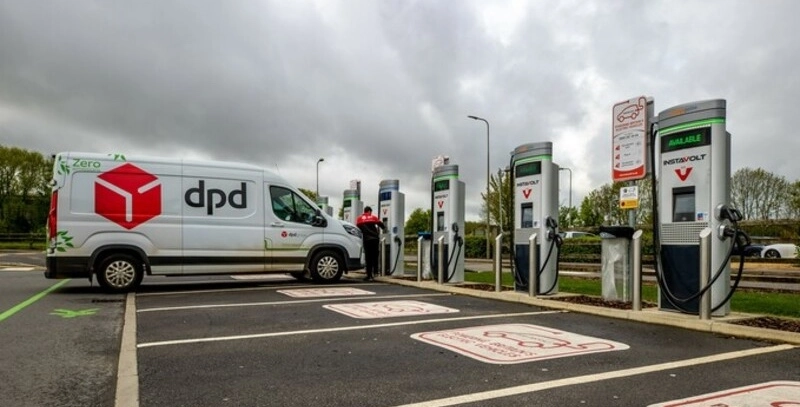Electromobility represents a significant challenge to today’s grid infrastructure.
As the number of electric vehicles (EVs) on the road increases, the need to optimize the use of their batteries as flexible storage solutions becomes crucial to managing peaks in demand and controlling costs.
In a groundbreaking research project supported by the Swiss Federal Office of Energy, DPD, a leading parcel service provider, is at the forefront of investigating intelligent and bidirectional charging using its fleet in Basel as a case study.
This initiative aims to glean insights that could effectively close the emerging electricity gap during peak times and contribute to stabilizing the grid.
The focal point of decarbonizing transportation has shifted from vehicles to power grids.
The primary challenge now lies in efficiently charging a large number of vehicle batteries simultaneously at a single location.
Given the time-consuming and costly nature of infrastructure upgrades, the importance of innovative solutions to optimize electricity consumption is on the rise.
Under the federally funded TEC-OFF research project, DPD is spearheading the testing of bidirectional charging with its vehicle fleet in collaboration with sustainability researchers from the ZHAW School of Engineering.
This approach leverages EV batteries as temporary storage to supply electricity back into the grid during peak demand, thereby aiding in grid stabilization.
Key to this initiative is the optimization of costs and the achievement of energy targets.
Electric trucks, for example, boast batteries capable of storing up to 1,000 kWh of energy and supporting bidirectional charging capacities exceeding 100 kW—ten times that of eCars.
Moreover, second-use truck batteries, while needing replacement after a certain mileage, can still be repurposed to stabilize the grid.
Ville Heimgartner, Senior Innovation Project & Sustainability Manager at DPD Switzerland, emphasizes:
“Our aim is to deploy our fleet of over 800 vehicles in such a way that we can optimize electricity costs, avoid expensive grid upgrades, and contribute to achieving Switzerland’s energy targets.”
Beyond bidirectional charging, the project explores other measures to optimize the overall system, such as needs-based vehicle charging throughout the day and investments in batteries with greater output than required solely for parcel delivery routes.
Scheduled to run until autumn 2025, the project also seeks to provide insights into integrating a logistics fleet into a private consumption community of buildings or companies (known as a ZEV in Switzerland).
To ensure the cost-effectiveness of these solutions, a simulation model is being developed to calculate total and life-cycle costs (TCO/LCC).
The TEC-OFF project is part of a prestigious research consortium supported by the Swiss Federal Office of Energy’s Research Programme Mobility and involves a range of partners.
The Institute for Sustainable Development at the ZHAW School of Engineering is a key research partner.
Professor Maike Scherrer, Head of Sustainable Supply Chain Management and Mobility at the Institute for Sustainable Development, notes:
“To facilitate the complete electrification of freight fleets, we are developing innovative solutions that place minimal strain on the grids and guarantee the full availability of the fleet.”
Technology company sun2wheel is developing the software and hardware for bidirectional charging and needs-based load management.
Sandro Schopfer, CEO and co-founder of sun2wheel, highlights the project’s potential, stating:
“In this project, we hope to understand how smart load management and storage elements can avoid expensive connection capacity upgrades while ensuring the electrification of the DPD fleet at the same time.”
Novatlantis, a knowledge and technology transfer specialist, is responsible for disseminating the project’s findings and project management.
Other partners include IWB and SBB Immobilien Development, which owns the Wolf site in Basel, among others.
The Wolf project site was chosen for its realistic analysis and testing environment, encompassing the DPD Green City Hub and the former Smart City Lab Basel.






